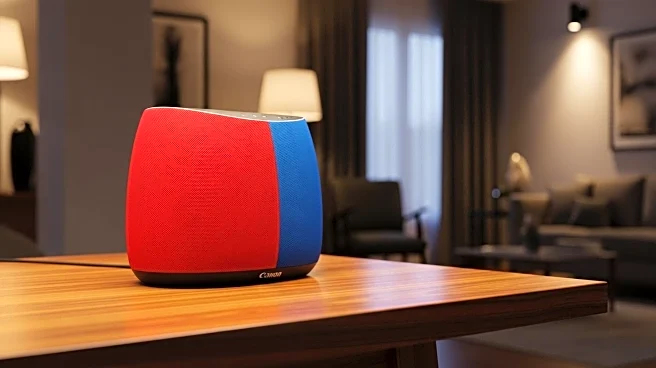What's Happening?
Amazon has significantly reduced the price of its Echo Pop smart speaker to $24 during its Prime Day event, marking a substantial discount from its usual price of $39. The Echo Pop, known for its compact size and robust audio quality, serves as a voice-controlled command center for smart home devices. Users can employ voice commands to control smart bulbs, thermostats, and plugs, streamlining home automation. The device supports various music streaming services, including Amazon Music, Apple Music, and Spotify, and can also connect via Bluetooth for local music streaming. The Alexa app allows users to create routines, enabling automated sequences triggered by a single command, such as a 'Good morning' routine that activates lights, starts a coffee machine, and provides weather updates.
Why It's Important?
The reduced price of the Echo Pop makes smart home technology more accessible to a broader audience, potentially increasing the adoption of IoT devices in households. This move by Amazon could lead to greater integration of voice-controlled technology in everyday life, simplifying tasks and enhancing convenience. The affordability of the Echo Pop during Prime Day may encourage consumers to explore smart home automation, driving demand for compatible devices and services. As more users integrate these technologies, there could be a shift towards more connected and efficient home environments, impacting energy consumption and lifestyle habits.
What's Next?
With the Echo Pop's price drop, Amazon may see a surge in sales, prompting further discounts or promotions on other smart home products. Consumers might begin to explore additional IoT devices to complement their Echo Pop, potentially boosting sales of smart bulbs, thermostats, and plugs. As voice-controlled technology becomes more prevalent, developers may focus on enhancing the capabilities of voice assistants like Alexa, improving user experience and expanding functionality. The increased adoption of smart home devices could also lead to advancements in home automation technology, fostering innovation in the industry.
Beyond the Headlines
The widespread adoption of voice-controlled devices raises questions about privacy and data security, as these devices continuously listen for commands. Consumers may need to consider the implications of having always-on microphones in their homes and the potential for data collection by tech companies. Additionally, the integration of smart home technology could influence home design and architecture, as spaces are adapted to accommodate these devices. The convenience offered by voice-controlled technology might also impact social interactions and daily routines, as individuals rely more on automated systems for tasks.










